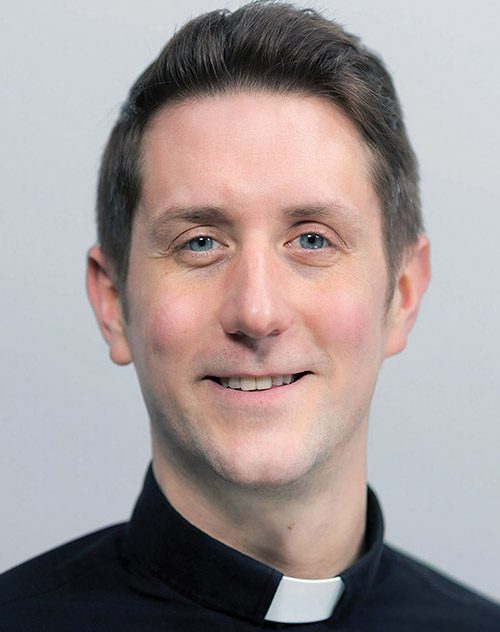
“The alleviation of suffering brings me joy. … Many of the stories of the New Testament are healings. Jesus sees people’s suffering, and he responds with mercy, healing and liberation. What joy—to be free from suffering after experiencing pain and hardship! I hope to contribute to the alleviation of suffering in some small-but-significant way as a Jesuit priest, activist and scholar.”
Will continue as a doctoral student in philosophy at Loyola University Chicago.

David Inczauskis, SJ, was born in Hinsdale, Illinois, and raised in Homer Glen, Illinois. Through Catholic Charities, his parents Colleen and Dale adopted him shortly after his birth. He graduated as valedictorian from Lockport Township High School in 2010 and upon graduating from Wake Forest University in 2014, received the Archie Award, the highest honor presented to a graduating senior. He met the Jesuits while studying liberation theology at Oxford University in England in 2012. The joyful witness of Fr. Simon Bishop, SJ, and the unwavering commitment to justice of Frs. Ignacio Ellacuría, SJ, and Jon Sobrino, SJ, inspired him to join the Society of Jesus immediately after college.
As a Jesuit, David has been particularly active in academics: studying or working at a university every year since taking first vows in St. Paul, Minnesota, in 2016. He published two books in Spanish, one in 2019 on Honduran theater and one in 2022 on Honduran cinema. His current research as a doctoral student in philosophy at Loyola University Chicago focuses on critical phenomenology and Latin American liberation philosophy. Also at Loyola Chicago, he serves as chaplain to the men’s volleyball team and to the Spanglish Christian life community. Off campus, he works as a community organizer with the Coalition for Spiritual and Public Leadership. He seeks to follow Jesus Christ at the intersection of thought and action.
Bachelor’s degree, Spanish and religion, Wake Forest University; Master’s degree, Spanish, Loyola University Chicago; Master’s degree, social philosophy, Loyola University Chicago; Bachelor of Sacred Theology, Facultés Loyola Paris; Licentiate in Sacred Theology, Facultés Loyola Paris
Not everyone would know that I worked at Dairy Queen for three years in high school. My friend saw a “help wanted” ad and challenged me to apply, so I did. It was a spur-of-the-moment thing. I was 15 at the time. My parents had to sign papers so that I could work as a minor. The job captures something of the spontaneous side of my personality. I have always felt that it is beneficial to embrace serendipity. God is a God of surprises, and many of the best moments in life come from saying “yes” to the seemingly random invitations — like working at Dairy Queen — that God extends to us.
St. Francis Borgia, SJ, has been a friend of mine for a while now. He was the great-grandson of both Pope Alexander VI and King Ferdinand II of Aragon as well as the Duke of Gandía and a grandee of Spain. After his wife died, Borgia gave up his titles and became a Jesuit. Eventually, he became our third superior general. His life puts into focus the radicality of the call of Jesus Christ, who said to the rich young man, and who said to me, “If you wish to be perfect, go, sell your possessions, and give the money to the poor, and you will have treasure in heaven; then come, follow me” (Matthew 19:21). What a challenge! And what a challenge to which Borgia dared to respond! I hope to follow Jesus in this way, unattached to wealth, beauty and power. It is very difficult and perhaps impossible without grace. St. Francis Borgia, pray for us!
The Society of Jesus is, and is nothing more than, a particular group of men whom God has called together. Perhaps I say so a bit facetiously, but it is true in the most important way. Pope Benedict XVI wrote, “Being Christian is not the result of an ethical choice or a lofty idea, but the encounter with an event, a person, which gives life a new horizon and a decisive direction.” So, too, with the Jesuits. We are people, and almost every novice who enters is attracted to the Society because he met a Jesuit who inspired him. Therefore, I do not love any “what” about the Society of Jesus; rather, I love the “who” of the Society of Jesus. I often find myself thinking, as one of Fr. James Martin’s book titles suggests, “Here, in the Jesuits, I am in good company.”
The alleviation of suffering brings me joy. Before and after entering the Jesuits, I have been witness to two related phenomena: people’s immense suffering and people’s attempts to alleviate this immense suffering. It is the latter that brings the greatest joy to my life. As a hospital chaplain in the trauma unit at Loyola Medical, I saw people suffer from bullet wounds, missing limbs and severe burns. On the flip side, I saw people recover with the help of caregivers, nurses and doctors. Their recoveries were very moving to me.
Similarly, as a spiritual director, I am privy to people’s internal suffering, and it is a true grace to see how God operates in their lives and frees them from the burdens they carry. The same is true of the struggle for liberation from social oppression. The epilogue of the film "The Battle of Algiers" gets me every time. After many years of suffering under French colonial rule, the Algerians free themselves. I find this impulse to alleviate suffering rather Christian. Many of the stories of the New Testament are healings. Jesus sees people’s suffering, and he responds with mercy, healing and liberation. What joy—to be free from suffering after experiencing pain and hardship! I hope to contribute to the alleviation of suffering in some small-but-significant way as a Jesuit priest, activist and scholar.